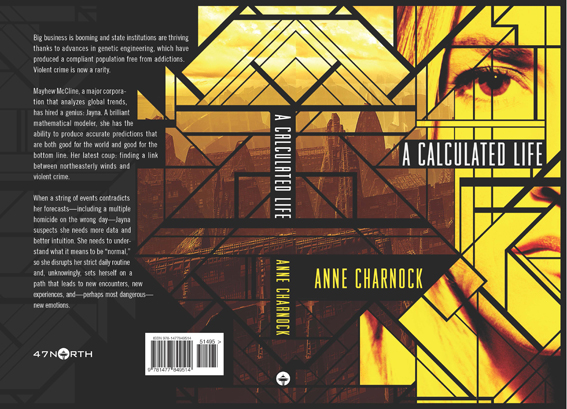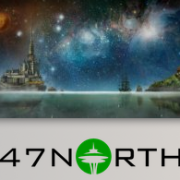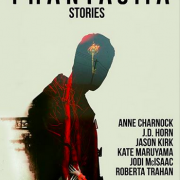5 Authors On Their Short Story Inspirations
Next week, my story “The Adoption” will be published in an anthology of speculative fiction—Phantasma—edited by J.D. Horn and Roberta Trahan. I decided to celebrate the anthology’s upcoming release by reflecting on a piece of short fiction that inspired my fiction writing. And this led me to wonder if my co-contributors could pinpoint short stories that influenced their own work.
So I’m delighted to share in this blogpost a few reflections on short form by J.D. Horn, Roberta Trahan, Jason Kirk and Kate Maruyama.
So here goes, in alphabetical order…
Anne Charnock
Earlier this year, I was approached with a fascinating request, namely, to suggest a short story that could be read as a companion piece to my novel A Calculated Life. This request came from The Science Fiction Book Club in London. I’m an avid short story reader and I mentally scanned through my favourite short-form writers—Angela Carter, Annie Proulx, Helen Simpson, JG Ballard, Will Self, Ted Chiang among many others. But I knew from the outset I had to choose “Super-Toys Last All Summer Long” by Brian Aldiss, first published in Harper’s Bazaar in 1969.
As a writer I’ve come to appreciate the strong emotional punch that short stories can deliver. This is certainly the case with “Super-Toys Last All Summer Long.” Aldiss deftly avoids any emotional content slipping into sentimentality.
writer I’ve come to appreciate the strong emotional punch that short stories can deliver. This is certainly the case with “Super-Toys Last All Summer Long.” Aldiss deftly avoids any emotional content slipping into sentimentality.
It starts: “In Mrs. Swinton’s garden, it was always summer.” In fact, the garden and her Georgian home are a hologram. She lives in a windowless city apartment with her husband, a synthetic boy named David and an animatronic teddy bear named Teddy. David confides in Teddy that he finds it difficult to communicate with his mother—he wants “Mummy” to know how much he loves her. Monica Swinton tries to love David but she wants a real boy.
The emotional punch in this story is delivered when Monica Swinton finds David’s incomplete love letters, intended for her. They’re written in crayon, each letter in a different colour to the one preceding.
It struck me in this short story, that David and Teddy were more empathetic than Mr and Mrs Swinton. At one point, David observes his mother: “Her face was blank; its lack of expression scared him.” I read this story many years ago, before I’d considered writing fiction. I’ve no doubt that “Super-Toys Last All Summer Long” led me into the so-called uncanny valley where “what is human” is open to question.
J.D. Horn
 My story “Pitch” in the Phantasma anthology originally ended with its unfortunate protagonist, a goat-faced boy named Billy, staring down a rifle barrel at an oncoming train, a train that Billy believes to be an incarnation of the Devil. The original narrative contained many hints suggesting that while Billy might be correct in his assumption that his life has been touched by the supernatural, it’s much more likely the highly suggestible boy has bent facts to fit into his—and his community’s—world view.
My story “Pitch” in the Phantasma anthology originally ended with its unfortunate protagonist, a goat-faced boy named Billy, staring down a rifle barrel at an oncoming train, a train that Billy believes to be an incarnation of the Devil. The original narrative contained many hints suggesting that while Billy might be correct in his assumption that his life has been touched by the supernatural, it’s much more likely the highly suggestible boy has bent facts to fit into his—and his community’s—world view.
When it was suggested that the story might better suit the Phantasma anthology if “Pitch” had a stronger paranormal element, I turned, as I have many time before, to H.P. Lovecraft’s “The Dreams in the Witch House” as a source of inspiration. The Cthulhu Mythos, whose elements were originated by Lovecraft and expanded upon by a long line of writers influenced by Lovecraft, with its “Elder Things” and old gods, springs from a place where science fiction intersects the occult.
“The Dreams in the Witch House”—much like its titular witch Keziah Mason—occupies the spaces in between, a place where mathematics are a key to magical power, and where the alternate dimensions of science fiction meet the witch’s foul familiar. The dark man, with his book of Azathoth that must be signed in blood, is reminiscent of the image of the Lord of the witches as popularized by the Malleus Maleficarum, but he doesn’t need to be interpreted as such; in Lovecraft’s universe, a case could be made that this figure—perhaps totally unrelated to the Devil we know—was the entity interpreted by Middle Age clerics as their faith’s own head demon.
In Lovecraft’s cosmic horror, there may be a “big G “ God, or there may not be, but there are incomprehensible and frightening entities whose access to power would certainly lead early man to view them as gods. Lovecraft created a space for cosmic horror that lies beyond theological debate. As a writer, I find the Cthulhu Mythos both a freeing and fertile space in which to create.
Jason Kirk
 Short stories are shared entertainment in my circle, and I usually narrate. Around campfires, on long car rides, and after meals at home, I play the voice of someone else’s story. Some stories go over better than others, so while thinking over the invitation to write this blog post, I polled members of my occasional audience for their favorite or most memorable of the stories I’d read to them. The answers surprised me.
Short stories are shared entertainment in my circle, and I usually narrate. Around campfires, on long car rides, and after meals at home, I play the voice of someone else’s story. Some stories go over better than others, so while thinking over the invitation to write this blog post, I polled members of my occasional audience for their favorite or most memorable of the stories I’d read to them. The answers surprised me.
Not only did everyone cite speculative fiction, but every story depicted an intimate human/animal interaction — each to each. Some of these interactions are metamorphic, like Karen Russell’s “Reeling for the Empire” (Vampires in the Lemon Grove), with its women of historical Japan turned into giant silkworms and made to spin silk for the imperial lords that enslave them. Other stories feature the symbiotic, as in Joseph Wurtenbaugh’s “The Old Soul,” which follows a microbial parasite that melds with its hosts in a gorgeous concerto of indivisible sentience. In still other stories, as often in life, the collision of humans and animals is merely pathetic. Rajesh Parameswaran’s “The Infamous Bengal Ming” (I Am an Executioner: Love Stories), for example, takes the perspective of a captive tiger who, in trying to show its love for humans, can’t seem to keep from fatally mauling them. These are the stories that my family and friends remember.
Of course, I choose them in the first place, so perhaps it’s not coincidental that my own contribution to Phantasma fits this profile. In “The Guardian from the Sea,” the protagonist is a mermaid, a metamorphic amalgam bound in unhealthy symbiosis to an abusive boyfriend, working at an adult video store in a pathetic near-future Southern California.
Metamorphosis, symbiosis, pathos… Perhaps I’m just giving my people what they want.
Kate Maruyama
 Short stories were my first zing in reading. I read plenty of long form books I adored and got lost in, but when I read Shirley Jackson’s “The Lottery,” set in a small New England town so familiar to me, made more familiar by her creeping, careful prose, I was scared to my core. I wondered if there was a similar harvest sacrifice in my town and my parents simply hadn’t had the nerve to tell me yet because they were trying to shelter me. They said they were going out to parties or to friends’ houses. How was I to know they weren’t drawing slips of paper once a year?
Short stories were my first zing in reading. I read plenty of long form books I adored and got lost in, but when I read Shirley Jackson’s “The Lottery,” set in a small New England town so familiar to me, made more familiar by her creeping, careful prose, I was scared to my core. I wondered if there was a similar harvest sacrifice in my town and my parents simply hadn’t had the nerve to tell me yet because they were trying to shelter me. They said they were going out to parties or to friends’ houses. How was I to know they weren’t drawing slips of paper once a year?
When I was in high school my dear friend–whom I (much) later married–gave me Stephen King’s collection, Night Shift which, story after story, dragged me in, twisted my head around and may have made me barf pea soup.
I then learned that there was a trove of short stories written in my own house. I knew my mother was a writer, but it was the new realization that I dug short stories as a genre, that had me cracking open Mr. DaV and Other Stories. I had no idea that this woman I called Mom–whom others called Kit Reed–was the consummate master of the short story. Careful crafting, wry wit, artful sentences and a creeping sense of something is very wrong here lay in each story. As well as that zing. Even today I read her stories, past and present and think, “How the hell did she pull that off?” sometimes having to reread to articulate what exactly it was that she has pulled off. The Story Until Now is the easiest place to get the best of them.
Roberta Trahan
 When asked why I write speculative fiction, my ready answer has always been that it was because speculation inspired the evolution of ideas which in turn inspired the evolution of mankind – and that the willingness to entertain all possibilities is a state of grace to which we should all aspire. It was only recently, when asked to name a short story that inspired me, that I realized how deep my passion for speculative fiction really runs.
When asked why I write speculative fiction, my ready answer has always been that it was because speculation inspired the evolution of ideas which in turn inspired the evolution of mankind – and that the willingness to entertain all possibilities is a state of grace to which we should all aspire. It was only recently, when asked to name a short story that inspired me, that I realized how deep my passion for speculative fiction really runs.
One of my earliest influences was Ray Bradbury’s collection The Illustrated Man, and in particular, his short story, “The Veldt”. First published in the 1950s, “The Veldt” is the tale of a couple who opts for a life of ease and purchases a home that provides for their every need. The house cooks and cleans and bathes and feeds and even rocks them all to sleep. It even parents the children. In time the couple begins to worry they may have rendered themselves irrelevant, and it isn’t long before they discover how right they are.
I first read this story as a teenager in the 1970s, when the cold war mentality was more focused on near future innovations and refining existing advances than on expanding the technological horizon. At that time I could not even imagine the “smart house” that Bradbury envisioned, one that may well become a reality in my lifetime. How eerily familiar this story feels today, as we so willingly and even eagerly integrate technology into our lives as quickly as we can – and rarely pause to ponder whether it is we who consume it, or it who consumes us.
“The Veldt” horrified and fascinated me in equal measure, and in the end left me with a profound understanding of how important it is to think beyond the idea and entertain its far-reaching impact. The best speculative fiction not only explores and enlightens; it also examines and evaluates the ideas it inspires. Perhaps this is why I am so affected by the cautionary tale, and the visionary works of authors like Shelley, Heinlein, Orwell, and of course, Bradbury.
The full list of contributors to Phantasma Stories:
Anne Charnock (author of A Calculated Life)
J. D. Horn (author of the Witching Savannah series)
Jason Kirk (author of Reverb:Poems)
Kate Maruyama (author of Harrowgate)
Jodi McIsaac (author of the Thin Veil series)
Roberta Trahan (author of The Dream Stewards series)










Leave a Reply
Want to join the discussion?Feel free to contribute!